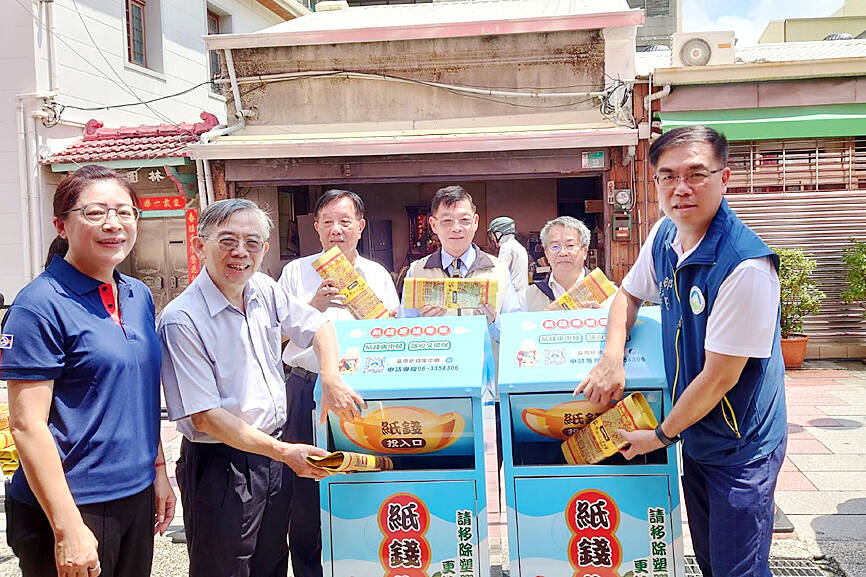Ahead of the Ghost Festival, Minister of Environment Peng Chi-ming (彭啟明) yesterday said the ministry would not ask people not to burn incense or joss paper (also known as ghost money), but would encourage people to do it in more eco-friendly ways.
Peng made the remark at a news conference held with the Tainan City Environmental Protection Bureau in Tainan yesterday, in which the bureau announced that Tainan has installed 19 joss paper collection boxes throughout the city as part of a new policy aimed at promoting centralized burning of the offerings.
The Ghost Festival is on the 15th day of the seventh month of the lunar calendar, which is on Aug. 18 this year, but throughout the seventh month of the lunar calendar, also known as Ghost Month, people prepare ritualistic food offerings and burn incense and joss paper to honor the visiting spirits.

Photo: CNA
“We hope that by collecting joss paper offerings and burning them centrally we can reduce air pollution,” the bureau said.
“We’re encouraging temples to cooperate with this new policy, which would allow people to continue following traditional practice while also taking environmental concerns into consideration,” Peng said.
Bureau Director Hsu Jen-tse (許仁澤) said the city had conducted a trial run of the policy in East District (東區) last year, where it received “an enthusiastic response.”
“This year we are to begin cooperating with PX Mart, who will help collect joss paper from collection boxes installed throughout the city,” he said.
Peng said burning the offerings together in large incinerators would be better for the environment since the incinerators would be equipped with filters and other equipment to reduce air-polluting emissions.
The public would also be encouraged to use “large-denomination” paper money to reduce the number of offerings that would be burned, as well as using offerings made from alternative materials that would emit fewer pollutants when burned, he said.
Separately, the ministry would begin its annual donation drive, accepting donations through any of the major convenience store chains, Peng said.
Those who donate could register their donation online through the ministry’s Web site, where they can enter the names of up to three deceased friends or relatives, he said, adding that the ministry would burn offerings for those individuals on behalf of the donor.
Tiantan Tiangong Temple chairman Hsu Kuo-jen (徐國潤) said that the traditional pudu ceremony, during which offerings are made for the deceased, was rooted in the hopes of the living to show benevolence, accumulate merit and pray for a good afterlife for their ancestors.
“However, over time people came to mistakenly believe that burning more offerings can ensure greater peace and prosperity for one’s family,” he said, adding that centralized burning of offerings was a good way to achieve the original aims of the ceremony in an environmentally friendly way.
Over the past three years, 68,000 tonnes of paper money have been burned at temples for pudu, while the amount of donations made through the annual donation drive has exceeded NT$160 million (US$4.87 million), the minister said.
“Our efforts have reduced the amount of offerings burned by about 1,500 tonnes annually, which amounts to nearly 3,000 tonnes less of emissions,” Peng said. “That is equivalent to the emissions of 2,200 large diesel vehicles driving 50,000 kilometers per year.”
Additionally, nine counties and cities across the country have established environmentally friendly and low-carbon temple certifications, which have already been obtained by 366 temples, he said.

Nipah virus infection is to be officially listed as a category 5 notifiable infectious disease in Taiwan in March, while clinical treatment guidelines are being formulated, the Centers for Disease Control (CDC) said yesterday. With Nipah infections being reported in other countries and considering its relatively high fatality rate, the centers on Jan. 16 announced that it would be listed as a notifiable infectious disease to bolster the nation’s systematic early warning system and increase public awareness, the CDC said. Bangladesh reported four fatal cases last year in separate districts, with three linked to raw date palm sap consumption, CDC Epidemic Intelligence

The manufacture of the remaining 28 M1A2T Abrams tanks Taiwan purchased from the US has recently been completed, and they are expected to be delivered within the next one to two months, a source said yesterday. The Ministry of National Defense is arranging cargo ships to transport the tanks to Taiwan as soon as possible, said the source, who is familiar with the matter. The estimated arrival time ranges from late this month to early next month, the source said. The 28 Abrams tanks make up the third and final batch of a total of 108 tanks, valued at about NT$40.5 billion

Two Taiwanese prosecutors were questioned by Chinese security personnel at their hotel during a trip to China’s Henan Province this month, the Mainland Affairs Council (MAC) said yesterday. The officers had personal information on the prosecutors, including “when they were assigned to their posts, their work locations and job titles,” MAC Deputy Minister and spokesman Liang Wen-chieh (梁文傑) said. On top of asking about their agencies and positions, the officers also questioned the prosecutors about the Cross-Strait Joint Crime-Fighting and Judicial Mutual Assistance Agreement, a pact that serves as the framework for Taiwan-China cooperation on combating crime and providing judicial assistance, Liang

A group from the Taiwanese Designers in Australia association yesterday represented Taiwan at the Midsumma Pride March in Melbourne. The march, held in the St. Kilda suburb, is the city’s largest LGBTQIA+ parade and the flagship event of the annual Midsumma Festival. It attracted more than 45,000 spectators who supported the 400 groups and 10,000 marchers that participated this year, the association said. Taiwanese Designers said they organized a team to march for Taiwan this year, joining politicians, government agencies, professionals and community organizations in showing support for LGBTQIA+ people and diverse communities. As the first country in Asia to legalize same-sex